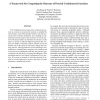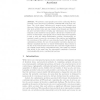21 search results - page 1 / 5 » A Framework for Computing the Outcome of Proxied Combinatori... |
WECWIS
2005
IEEE
13 years 10 months ago
2005
IEEE
Proxy bidding has been proposed for combinatorial auctions as a means to speed up the auctions, to simplify the user interface, and to limit strategic behavior. The only previousl...
ACMICEC
2003
ACM
13 years 10 months ago
2003
ACM
Combinatorial auctions are difficult to analyze in part because of the vast number of potential strategies available to the bidders. Proxy bidding interfaces limit the users’ s...
AAAI
2000
13 years 6 months ago
2000
Iterative auctions have many computational advantages over sealed-bid auctions, but can present new possibilities for strategic manipulation. We propose a two-stage technique to m...
FC
2009
Springer
13 years 11 months ago
2009
Springer
We present a cryptographic protocol for conducting efficient, provably correct and secrecy-preserving combinatorial clock-proxy auctions. The “clock phase” functions as a trust...
AMAI
2005
Springer
13 years 4 months ago
2005
Springer
We consider auction design in a setting with costly preference elicitation. Well designed auctions can help to avoid unnecessary elicitation while determining efficient allocations...


